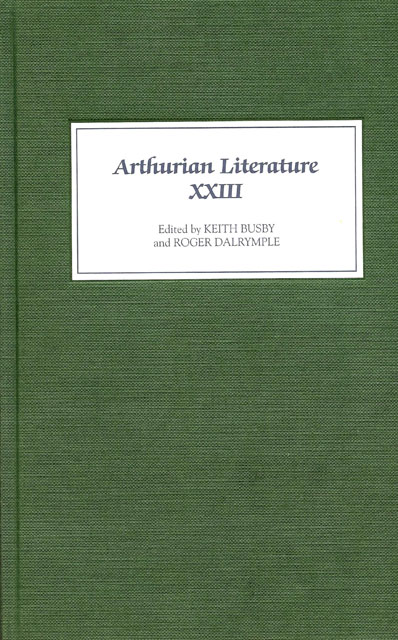Book contents
- Frontmatter
- Contents
- General Editor’s Foreword
- I Beyond Shame: Chivalric Cowardice and Arthurian Narrative
- II Malory’s Forty Knights
- III Fooling with Language: Sir Dinadan in Malory’s Morte Darthur
- IV William Caxton, Wynkyn de Worde and the Editing of Malory’s Morte Darthur
- V Ballad and Popular Romance in the Percy Folio
- VI Local Hero: Gawain and the Politics of Arthurianism
- VII Promise-postponement Device in The Awntyrs Off Arthure: a Possible Narrative Model
- VIII L’Atre perilleux and the Erasure of Identity
- IX The Theme of the Handsome Coward in the Post-Vulgate Queste del Saint Graal
- X A Time of Gifts? Jean de Nesle, William A. Nitze and The Perlesvaus
- XI Thomas Love Peacock’s The Misfortunes of Elphin and the Romantic Arthur
- Contents of Previous Volumes
VI - Local Hero: Gawain and the Politics of Arthurianism
Published online by Cambridge University Press: 23 March 2023
- Frontmatter
- Contents
- General Editor’s Foreword
- I Beyond Shame: Chivalric Cowardice and Arthurian Narrative
- II Malory’s Forty Knights
- III Fooling with Language: Sir Dinadan in Malory’s Morte Darthur
- IV William Caxton, Wynkyn de Worde and the Editing of Malory’s Morte Darthur
- V Ballad and Popular Romance in the Percy Folio
- VI Local Hero: Gawain and the Politics of Arthurianism
- VII Promise-postponement Device in The Awntyrs Off Arthure: a Possible Narrative Model
- VIII L’Atre perilleux and the Erasure of Identity
- IX The Theme of the Handsome Coward in the Post-Vulgate Queste del Saint Graal
- X A Time of Gifts? Jean de Nesle, William A. Nitze and The Perlesvaus
- XI Thomas Love Peacock’s The Misfortunes of Elphin and the Romantic Arthur
- Contents of Previous Volumes
Summary
Parallel Lives I: Owain Glyn Dwr
On 21 July 1403 the army led by Henry Hotspur was defeated by Henry IV at the Battle of Shrewsbury. Hotspur's army consisted of Welsh lords, Scotsmen and disaffected English nobles, Hotspur himself and his uncle, Thomas Percy, earl of Worcester. Hotspur died in the aftermath of this battle and the Earl of Worcester was executed two days later. The Battle of Shrewsbury was one of a series of engagements and skirmishes that together comprised the Glyn Dwr rebellion: between 1400, when he had himself declared Prince of Wales, and 1415, when he makes his final appearance in English records as a hunted guerrilla leader, Owain Glyn Dwr was the leader of a Welsh revolt against English rule. Yet the revolt was not, as is already indicated by the presence of Hotspur, a purely Welsh affair: it was supported by northern lords, the Percies as well as Scotsmen and Irishmen. What is made clear by these alliances is the fragmented nature of the kingdom in the fifteenth century – and already, in saying that, one is confronted by problems: what kingdom? which fragments?
The late twelfth-century historian, Ralph, dean of St. Paul’s, wrote that the kingdom was ‘wide in extent, peacefully governed and contained within it some very barbarous inhabitants, the Scots and the Welsh’. John Gillingham comments:
Dean Ralph's view encapsulates two perceptions of fundamental importance for the history of the UK: the first that the King of England is the ruler of Britain; the second that some of his subjects are barbarians. Given that, for all its power then and in subsequent centuries, the English state never managed to introduce measures for the effective integration of the ‘Celtic’ parts of the British Isles which it controlled into its own, distinctively English, political community, this new assumption was to be of critical significance. It meant that those whose lands were taken often remained undervalued and alienated. If English powers tended to unite Britain and Ireland, English attitudes tended to divide; hence the long history of a disunited kingdom.
James Campbell has remarked that the closest modern parallel to the Anglo-Welsh border is provided by the Indian north-west frontier or Afghanistan, both sites of constant renegotiation, division, faction and fundamentalism.
- Type
- Chapter
- Information
- Arthurian Literature XXIII , pp. 81 - 94Publisher: Boydell & BrewerPrint publication year: 2006



